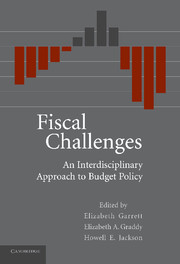Book contents
- Frontmatter
- Contents
- Preface
- Contributors
- PART ONE THE LAW AND POLITICS OF FISCAL POLICY
- 1 The Congressional Budget Process
- 2 Budget Gimmicks
- 3 Transparency in the U.S. Budget Process
- 4 European Experiences with Fiscal Rules and Institutions
- Part One Bibliography
- PART TWO UNDERSTANDING FEDERAL DEFICITS AND PUBLIC DEBT
- PART THREE BUDGETING AND FISCAL CONSTRAINTS AT THE STATE LEVEL
- PART FOUR INTERGOVERNMENTAL ASPECTS OF BUDGET POLICY
- PART FIVE JUDICIAL POWERS AND BUDGET POLICY
- Index
2 - Budget Gimmicks
Published online by Cambridge University Press: 23 December 2009
- Frontmatter
- Contents
- Preface
- Contributors
- PART ONE THE LAW AND POLITICS OF FISCAL POLICY
- 1 The Congressional Budget Process
- 2 Budget Gimmicks
- 3 Transparency in the U.S. Budget Process
- 4 European Experiences with Fiscal Rules and Institutions
- Part One Bibliography
- PART TWO UNDERSTANDING FEDERAL DEFICITS AND PUBLIC DEBT
- PART THREE BUDGETING AND FISCAL CONSTRAINTS AT THE STATE LEVEL
- PART FOUR INTERGOVERNMENTAL ASPECTS OF BUDGET POLICY
- PART FIVE JUDICIAL POWERS AND BUDGET POLICY
- Index
Summary
BUDGETARY CHALLENGES AND TEMPTATIONS
One pesky reality of budgeting is that it requires the use of numbers. Ideally, of course, federal budget information should offer an accurate picture of the nation's fiscal health. On the other hand, we should not have unreasonable expectations. Precise budget projections often require us to know the unknowable. Despite increasingly sophisticated modeling techniques, economists have no crystal ball to reveal future demographic, economic, and policy changes. This lack of complete information creates exponentially greater challenges as the time frame or “window” for budget projections extends into the future. Lest they succumb to complete legislative paralysis, policymakers inevitably must use some estimate of the economic consequences of their actions. Despite sincere attempts to be fiscally responsible and without any deliberate attempt to manipulate or deceive, budget forecasters may simply get the numbers wrong. Many may fool themselves into thinking that they know the short- or long-term economic effects of their policy choices, suffering from what Michael Graetz has called “illusions of precision.” Such illusion or imprecision is not the primary focus of this chapter. Instead, my focus is on the deliberate manipulation of numbers or the use of other budget tricks in pursuit of a particular political agenda.
Taxpayers and the politicians who represent them often suffer from the same budget pathology. We want to have it all – increased spending for favored government programs, decreased tax burdens, and a budget surplus.
- Type
- Chapter
- Information
- Fiscal ChallengesAn Interdisciplinary Approach to Budget Policy, pp. 39 - 67Publisher: Cambridge University PressPrint publication year: 2008
- 6
- Cited by



